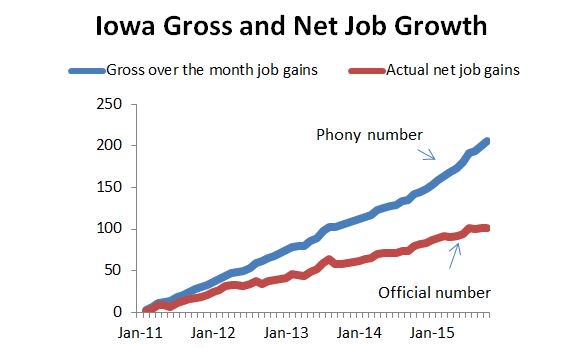graph of nitrates in the Des Moines River exceeding safe levels, taken by Steven Witmer using data from the U.S. Geological Survey
The Des Moines Water Works announced yesterday that it spent some $1.5 million during 2015 to operate its nitrate removal system “for a record 177 days, eclipsing the previous record of 106 days set in 1999.” The utility provides drinking water to about 500,000 residents of central Iowa, roughly one-sixth of the state’s population. The U.S. Environmental Protection Agency considers 10 mg/l the maximum safe level for nitrates in drinking water. The Des Moines Water Works switches the nitrate removal system on when nitrates exceed 9 mg/l in both of its sources, the Raccoon River and the Des Moines River. I enclose below the full press release from the Water Works, as well as charts from the U.S. Geological Survey’s website showing recent nitrate levels in the Raccoon and Des Moines rivers.
Runoff from agricultural land is the primary source of nitrates in Iowa waterways. As David Osterberg wrote yesterday, “so little land in Iowa is devoted to urban uses (lawns or golf courses) that even if urban application rates of Nitrogen and Phosphorous fertilizer were much higher than that on farms, only 2 percent of the pollution from land application of fertilizer comes from lawns and golf courses.” This “nutrient pollution” not only incurs extra costs for providing safe drinking water but also creates toxic algae blooms, which caused a record number of beach advisory warnings during the summer of 2015.
Last January, the Des Moines Water Works filed a lawsuit against drainage districts in northwest Iowa’s Sac, Calhoun and Buena Vista Counties. Drake University Law Professor Neil Hamilton wrote an excellent backgrounder on this unprecedented litigation: Sixteen Things to Know About the Des Moines Water Works Proposed Lawsuit. In a guest column for the Des Moines Register last May, Hamilton debunked the “strenuous effort” to convince Iowans that “the lawsuit is unfair and unhelpful.”
Governor Terry Branstad has depicted the lawsuit as a sign that “Des Moines has declared war on rural Iowa” and repeatedly criticized the Water Works last year. Iowa Secretary of Agriculture Bill Northey claims the water utility “has attempted to stand in the way of these collaborative efforts” to reduce nutrient pollution. A front group funded by the Iowa Farm Bureau and other agribusiness interests and led by Cedar Rapids Mayor Ron Corbett, among others, has also tried to turn public opinion against the lawsuit. In recent weeks, that group with the Orwellian name of Iowa Partnership for Clean Water has been running television commercials seeking to demonize Water Works CEO Bill Stowe.
Northey, Corbett, and Lieutenant Governor Kim Reynolds may soon become bitter rivals for the 2018 GOP nomination for governor. But those three will stand together opposing any mandatory regulations to reduce agricultural runoff. All support Iowa’s voluntary nutrient reduction strategy, shaped substantially by Big Ag and lacking numeric criteria strongly recommended by the U.S. EPA.
William Petroski and Brianne Pfannenstiel report in today’s Des Moines Register that Branstad “is exploring a legislative proposal that would provide money for water quality projects by using projected revenue growth from an existing statewide sales tax for schools.” Apparently “superintendents have been getting called to the state Capitol to discuss the proposal” with Branstad and Reynolds. Fortunately, that cynical attempt to pit clean water against school funding appears to have zero chance of becoming law. Of the ten state lawmakers or representatives of education or environmental advocacy groups quoted by Petroski and Pfannenstiel, none endorsed the half-baked idea. Their reactions ranged from noncommittal to negative. Speaking to Rod Boshart of the Cedar Rapids Gazette, Iowa Senate Majority Leader Mike Gronstal said of a possible Branstad proposal on water quality funding, “We certainly would be willing to look at that but we’re not going to cannibalize education or the basic social safety net so that he can put a fig leaf on his record on the environment.”
UPDATE: Erin Murphy reported more details about Branstad’s proposal: extend the 1 percent sales tax for school infrastructure, dedicate the first $10 million in annual growth to schools and allocate the rest to water programs.
SECOND UPDATE: Added below excerpts from Murphy’s report for the Cedar Rapids Gazette on Branstad’s plan. I’m disappointed to see U.S. Secretary of Agriculture Tom Vilsack endorse this ill-conceived proposal. Of course we “need to work on [water quality] now,” but why does the money have to come out of school funds? Remember, the Branstad administration is already pushing a corporate tax break that will cost public school districts millions of dollars a year for infrastructure on top of tens of millions of dollars in lost state revenue.
THIRD UPDATE: Branstad told reporters today he does not believe there is support in the legislature to raise the sales tax. Under a constitutional amendment adopted in 2010, 3/8 of a cent of the next Iowa sales tax increase would flow into the natural resources trust fund. He also indicated that he would not support extending the penny sales tax for school infrastructure beyond 2029, when it is scheduled to expire, without lawmakers agreeing to divert some of the funding to water programs. According to incoming Iowa House Speaker Linda Upmeyer, “House Republicans have been divided on whether to extend the school infrastructure sales tax beyond 2029.”
Continue Reading...










